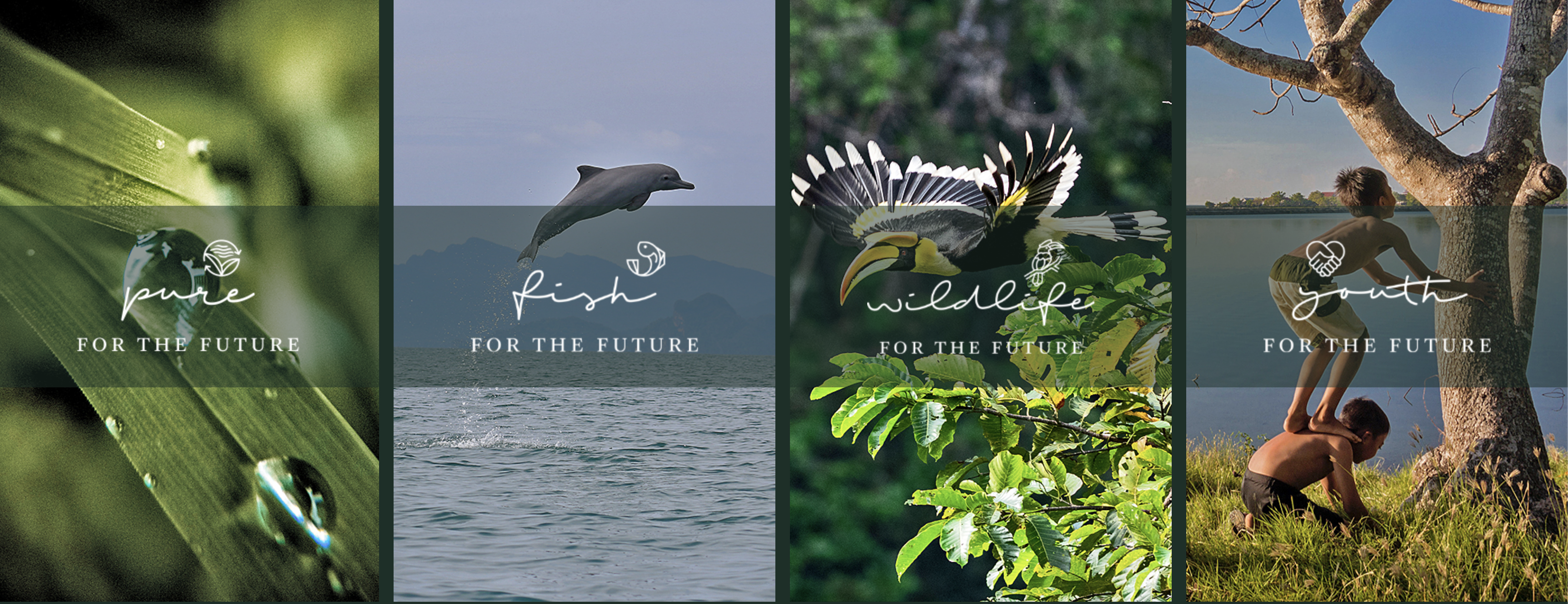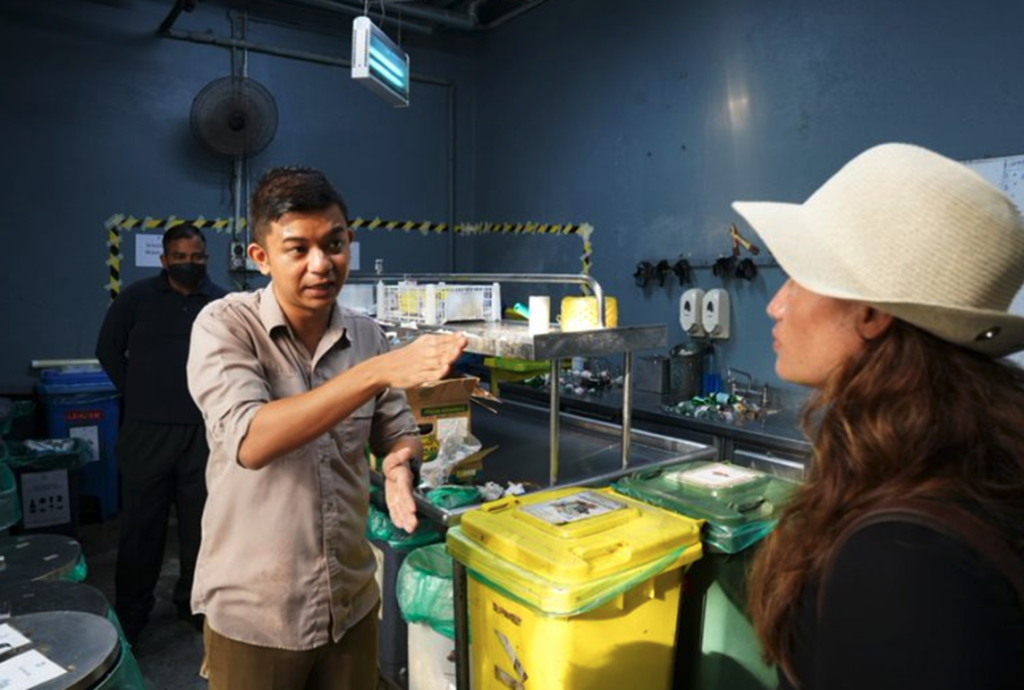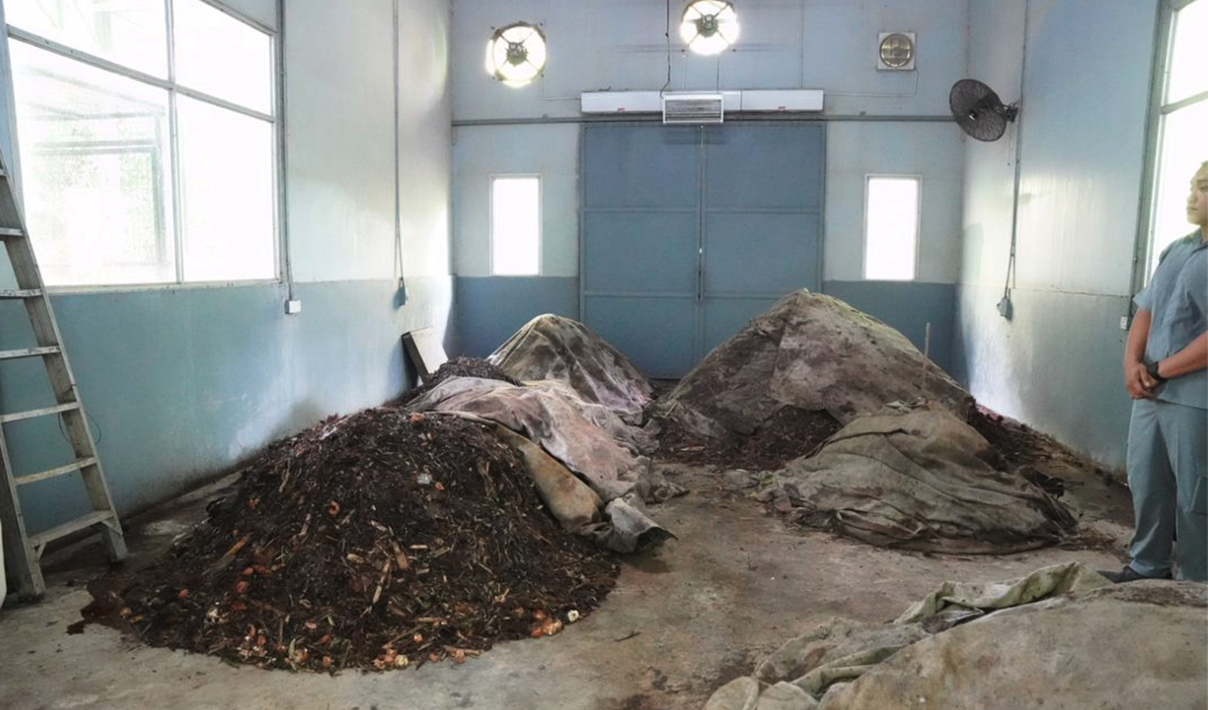The Datai Langkawi shares its process and team culture for managing hotel waste in ethical and beneficial ways for the local community and their guests.
“Sometimes guests ask me, ‘Are you running a research centre or a hotel here?’”
My colleagues Neyna, Becky and I are sipping a delicious local tea at the entrance veranda of The Datai Langkawi lobby with the Director of Rooms, Wenzel Weinich.
Wenzel and his team have designed a phenomenal 3-hour tour for us, including a morning forest walk, a visit to their coral restoration activities as well as The Nature Centre, an experience of a guest tour through their Sorting Centre, a stroll through their permaculture gardens, nursery and composting areas, a visit to The Lab where they conduct workshops like upcycling… and we are reminded we must be on time otherwise we might barely fit it all in!
It is a testament to The Datai Langkawi’s level of commitment and work that we experience but a fraction of their responsible tourism offerings on our visit. And it is why some of their guests express surprise and admiration for the extraordinary efforts made to do so.

Lovingly named ‘Matilda’ by Dev Abdullah (Nature Centre Manager),
this grand tree is a 300-400 year-old strangling fig (Ficus aurea)
located in the forested area of The Datai.
Photo by Rebecca Chin, The Habitat Foundation.
The team’s sense of purpose in preserving the incredible natural beauty of their site is evident in all our interactions. We are led by eminent naturalist and The Nature Centre Manager, Dev Abdullah, on a morning forest walk to learn about The Datai’s extensive sustainability approaches.
In a handful of minutes, I have heard the names of three orchids (I’ll never remember them, but one of them sounded like the French word for ‘rabbit’), learnt that coconut trees are not the original beach tree of Langkawi’s shores (it’s the hibiscus), and met ‘Matilda’, a fig tree estimated to be 300-400 years of age.
I find myself imagining what this magnificent tree witnessed on the sandy shores of Langkawi over centuries. And then, what of the future? There is a deep connection, an informed understanding, and respect for the natural world felt by The Datai Langkawi’s community that underpins their values and activities.
There are researchers, experts, passionate enthusiasts and storytellers on the staff who see the thread of life from past to present, and how all our futures hang in the balance of our choices. These values led to standards which ensure the hotel’s activities not only seek to limit harm but actively regenerate the land and the sea: beyond preserving what is left, there is an effort to bring back life and support it to thrive.

Dev Abdullah explains why their beach, in his humble opinion, is the best in Langkawi.
Photo by Rebecca Chin, The Habitat Foundation.
The Datai Langkawi is a well-known premier hotel dating back from 1993; importantly, in 2019, the resort became the first organisation in the world to be awarded the EarthCheck ECO Certification Programme for terrestrial tourism projects, establishing its reputation as a more sustainable, nature-embracing, and ethically managed resort.
EarthCheck ECO Certification is based on the Global Sustainable Tourism Council’s criteria which manages the global standards for sustainable tourism for destinations (aimed at policymakers and destination managers) and industry (aimed at hotels and tour operators).
Known for its luxury and secluded location on the northwest corner of Langkawi island, The Datai has, local islander Dev boasts, “the best beach on the island, but perhaps I’m biased.”
With a strong following of repeat global visitors (you get a plaque with your name for your room if you visit five times), The Datai could have continued in its tried and tested fashion, simply weathering the pandemic and returning with a nice renovation and maybe some additional local community wares in its already alluring gift shop (now you’re discovering one of my biases…).
But specific changes related to sustainability came after its first major renovation in about 25 years. These changes had far-reaching repercussions across the entire hotel’s activities and guest experiences. The hotel now evaluates and innovates its offerings based on The Datai Pledge, which enshrines their embedded approach to responsible and regenerative tourism.

The four pillars of The Datai Pledge. Image retrieved from
https://thedataipledge.org/ August 7, 2023
During our visit and laughter-filled conversations with charming staff, it became clear that there were some conditions that supported their success in overcoming challenges together. We saw in action The Datai Langkawi’s commitment to using their position to share their learning freely across the local and global landscape so it might benefit the wider community.
So, here’s a set of guiding questions and ideas for managing waste based on the approaches shared with us:
1. Count the waste: What are you disposing of?
Under The Datai Pledge’s ‘Pure for the Future’ pillar, guests are invited to see where the hotel’s wet (food) and dry (clothes, paraffin, wood, metal, plastic, rubber, styrofoam) waste is sorted and recorded in its dedicated Sorting Centre.
This process allows the hotel to understand more deeply how much and what types of waste they produce. It is not an expensive system, it is a bunch of well-organised bins, a large whiteboard, and a willing, dedicated and innovative team.

The Datai Langkawi team shows how they record waste daily in the Sorting Centre.
Photo by Rebecca Chin, The Habitat Foundation.
In addition, it is a way for The Datai Langkawi to raise awareness around new lifestyle choices guests can make while travelling (and in ‘normal’ life), as well as aligning with guests who choose this hotel for its commitments to regenerative tourism.
2. Once you know what you dispose of, figure out who and where this product is needed
The team described how they considered different ways to distil waste items into reusable materials. For example, vegetable waste is processed into compost and used around the hotel for landscaping and in the garden. I gaped at the number of kilograms a day, but Assistant Manager of Sustainability, Zakwan Zamri, smiled as he said, “Actually, this is not a lot!”
The team described how the data gives them an appreciation of the types of materials they have and how much they can reuse, but also recognising that for such a large site, the food waste can only provide so much. For any operator, it is important to embrace the ebbs and flows of hotel activities over seasons, so by monitoring the changes, you can understand what can feasibly be reused or reduced.

Zakwan Zamri, Assistant Manager of Sustainability, explains how waste is sorted and managed by their fantastic team in their processing rooms.
Photo by Rebecca Chin, The Habitat Foundation.
3. What is the process to get the product to where it needs to go?
The hotel separates its food waste into three parts:
- First is the waste, which is 100% vegetable and plant-based, which is processed to become compost and used in the garden.
- The second is a mixture of vegetable and meat waste, which is donated to the chicken farmer who supplies the hotel with his produce and collects the waste during the deliveries.
- The third is all the byproducts of meat and fish which are no longer in a condition to be used by the hotel, this is donated to the community, who cook it to be used as good quality feed for their farm dogs.
A short time after they began this arrangement, the farmers started to say ‘no’ to the meat waste, as it was requiring several rounds of cooking per day to process the large quantities. The Datai team realised they needed to extend a little bit of help, without affecting the farmers’ ownership of the solutions.
The Datai team purchased one large pot for the farmers so the cooking could be completed in one round. This was a reasonable purchase for the team and also meant the farmers were still fully in charge of their part in the resource management process. The hotel is clear they don’t want to encourage imbalances and dependencies, which damage the relationships and livelihoods in the long-run.
The Datai Langkawi’s Wenzel Weinich, Director of Rooms, advocates for how The Datai Pledge means developing these kinds of thoughtful partnerships with local communities and experts. In particular, he shares how impressed he is with the team members who often go out of their way and even on their days off to forge these relationships in meaningful ways.
4. Creating a sense of collective pride
Wherever we went to see aspects of The Datai Pledge in action across the hotel site, different staff explained their roles and the impact of their work with pride.
I shared this with Wenzel and Dev, who promptly shared their admiration for each other in making this culture a reality. Creating a long-term plan for responsible tourism takes courage and foresight, and as Wenzel proudly gushes, it takes amazing staff who are dynamic, who use their expertise, who can tell the management what is needed openly, and who implement ideas through the rounds until good solutions are found.
Since change is inevitable, having a resilient, adaptable, and goal-aligned team with evident pride in the part they play is a driving force for improvement.

Sipon welcomes guests enthusiastically to The Datai’s Sorting Centre Wet Room.
Photo by Rebecca Chin, The Habitat Foundation.
It is also noted that in order to create this kind of environment, the management supports risk-taking and learning from mistakes continuously. Weekly meetings address concerns raised by guests, and where they pertain to sustainability issues, the team can reflect and respond quickly (like the time a monitor lizard played havoc with their vegetable compost pile and they had to spend hours re-composting and dealing with the smell!).
Operators can consider how their team culture creates conditions for trust, creativity, and innovation. Indeed, examples from global operators, big and small, have emphasised that errors and adaptations are part of any sustainability shift.

Thought is given to keeping smells away from guests by moving composting materials into purpose-built buildings
away from the main thoroughfares. Photo by Rebecca Chin, The Habitat Foundation.
5. “Without risk, we cannot learn”
The Datai Langkawi illustrates a collective culture of genuine commitment and investment in these endeavours, from the management level to each individual staff member.
From selecting tea leaves from their garden served in the waiting areas to developing nature-friendly excursions for guests like kayaking (instead of noisy jet skis), all these choices have wide-reaching repercussions for the hotel’s operations, when viewed through the lens of The Datai Pledge.
In the current industrial system, sustainability endeavours are arguably not the financial choice for a clear return on investment. The Datai Langkawi acknowledge this but state they have seen benefits as many guests deliberately choose to stay with them because of their commitment to sustaining the natural ecosystem.
Guests can learn about the primates, make their own natural mosquito spray, or plant coral to reforest the local reef. Indeed, this regeneration of the coral reef in their bay for future generations once again demonstrates The Datai Langkawi’s level of commitment – in the short term, it’s over a million ringgit of investment, but the regeneration of the marine ecosystem is priceless.
Wenzel emphasised that the team sees its role in being willing to take these risks so as to pioneer approaches in the regional and global hotel industry. They willingly share their learning with other like-minded partners across the industry and seek meaningful partnerships.
In the same way, other operators can consider what level of risk and investment they want to take and who are the partners they can work with to see this work actualised.
‘Exclusive’ hotels are often seen as just that – keeping community and nature out. Instead, The Datai Langkawi actively brings in locals, who are passionate about a thriving future for Langkawi’s community and natural assets.
Pioneering hotel owners of any size can be inspired to get started with simple tracking of their own waste, figuring out who in their local community can benefit from what is disposed of, and how to realise the whole process through collaboration.
Find out more about The Datai Pledge and its annual Impact Report
Learn about the EarthCheck ECO Certification Programme and the Global Standards Tourism Council
Writer: Chrissy Lind-Hunter (GreenSmiths/The Habitat Foundation)
Contributors:
- The Datai Langkawi staff:
Mohd Zakwan Zamri (Assistant Manager of Sustainability), Dev Abdullah (The Nature Centre Manager), Wenzel Weinich (Director of Rooms), Remi Giromella (Director of Quality Control and Improvement) and many others we met.
- Irshad Mobarak (Chief Advisor, The Datai Pledge and Founder of ReWild Desaru)

